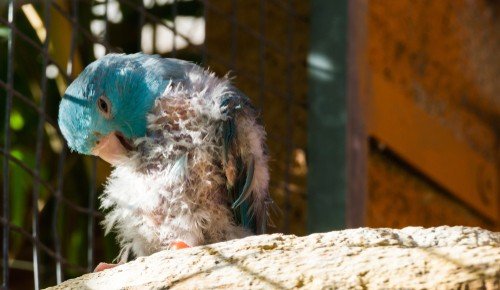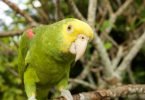If your bird is plucking feathers out, you must be concerned about their health. Excessive feather plucking is alarming. Birds usually do it as a response to loneliness, boredom, depression, and feeling unstimulated. There may be many other causes of bird plucking feathers.
Some birds may pick their feathers when they are ill. As a bird owner, you may want to learn, “how to stop my bird from plucking feathers?” Learn how to identify signs of feather plucking and how to get a bird to stop plucking feathers. It cannot happen overnight. Be patient. Take one day at a time.
But, first things first.
Step 1: Make a Trip to the Avian Vet
If your bird is suffering, is in pain, or sick, it may pluck feathers and try to cope. Birds do not understand pain or illness. Their instinct forces them to try to stop or remove the pain that is bothering them. As a result, they pluck feathers.
Hormonal factors are also responsible for feather plucking. Only a vet can treat it.
- The vet checks for all kinds of infections – viral, bacterial, fungal, parasite, heavy metal poisoning
- Many bird owners wrongly presume feather plucking to be a behavioral problem, while it could be a sign of a medical issue like parasites, chronic pain, or cysts
Step 2: Monitor the Bird’s Diet
Malnutrition is another root cause of birds plucking feathers, which also leads to sickness. Some common deficiencies in birds are calcium, manganese, magnesium, selenium, and zinc. It is all because of diet. Malnutrition makes the bird’s skin dry, itchy, and flaky, which may cause your bird to pluck its feathers.
- Selective feeding is the root cause of malnutrition in birds. Birds generally eat what they like. Owners also allow their birds. When a bird has just one type of food, it does not receive all the necessary nutrients.
- Feed your bird the right formulated pellets made for the species to make sure it gets all the nutrients needed. 75% pellets, with vegetables, leafy greens, and fruits comprising another 25%, makes a perfect diet.
Step 3: Make Sure Birds Get Some Sunlight
Make sure your bird is getting enough sunlight. Sunlight is the rich source of vitamin D, which prevents malnutrition.
- Place the cage in a place where there is plenty of sunlight
- However, avoid direct sunlight as it may cause overheating
Step 4: Treatment for Behavioral Issues
Boredom is the primary cause of feather plucking. To make sure your bird is stimulating adequately, give him some great toys. Remember, birds are highly intelligent. They get bored with old toys very quickly. To keep the bird interested in new toys, you can:
- Include interactive toys to make birds think
- Avoid buying more toys
- Keep the toys in separate groups and rotate it
- Mimic the wild environment. Birds living in the wild do not pluck feathers.
Step 5: Check the Bird Cage
Is it time to give your bird a larger cage?
Birds need room to spread their wings and to move around. If that’s not happening, or the bird is not getting adequate stimulation, they will pluck feathers.
With respect to the cage, note the following:
- Make sure the cage is 4 feet tall, 2 feet wide, and 3 feet long
- Watch your bird’s movements inside the cage. If he is unable to spread its wing, fly around, and move, you must change it
- Provide perches or different sizes that would allow the bird to move around and even change things. Choose natural materials such as wood, non-toxic plastic, and cloth.
Step 6: Use Bird Barriers & Collars
While it may seem unnatural, collars or barriers are essential to prevent the bird from destroying feathers or engaging in any self-mutilation behavior.
- Wide range of barriers are available on this market today, made of soft fabric, with inserts, made of plastic or having Kevlar inserts
- Accustom the bird to wearing apparel so that he can follow the technique. It becomes less stressful for your bird and he would not chew the barrier or collar quickly.
Step 7: Give Feather Growth Supplements
Avian veterinarians may recommend a feather growth supplement combined with specific multi-vitamin, which helps birds. There are many such supplements available on the market.
If the bird is plucking feather for quite some time now, constant feather regeneration may take a toll on the nutritional status of the bird. As a result of constant irritation, feather follicles are damaged, and a bird’s skin tends to become more sensitive.
Birds are prone to obsessive and anxious behaviors, which makes them avid feather pickers. Depending on your bird’s intensity, you may want to implement some prescription medication to modify their behavior.
Prescription drugs are used to calm or modify the bird’s behavior.
Conclusion
Watch out for warning signs in your bird. When the bird is ill or stressed, do not try to touch or comfort it. One of the first few signs to observe is whether or not your bird is perching on your hand. It becomes more concerning if your bird did it before. Identify the possible reasons for their behavior, such as environmental changes, changes in routine, lack of stimulation, lack of mating or bonding time, etc.
Be consistent in your approach, as it would help your bird to recover. Birds prefer steady environments that do not change. So, avoid shifting the cage to prevent causing stress to the bird. Keep the bird busy and guessing.
To learn more about different behavioral issues in birds, click the article Most Common Behavior Problems in Birds.





